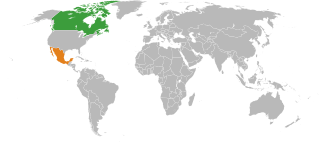
The foreign relations of Canada are Canada's relations with other governments and nations. Canada is recognized as a middle power for its role in international affairs with a tendency to pursue multilateral and international solutions. Canada's foreign policy based on international peacekeeping and security is carried out through coalitions, international organizations, and the work of numerous federal institutions. Canada is often called upon to serve as a mediator in international conflicts. The strategy of the Canadian government's foreign aid policy reflects an emphasis to meet the Sustainable Development Goals, while also providing assistance in response to foreign humanitarian crises. The Canadian Security Intelligence Service (CSIS) is tasked with gathering and analyzing intelligence to prevent threats such as terrorism, espionage, and foreign interference, while the Communications Security Establishment (CSE) is focused on cyber security and protecting Canada's digital infrastructure.

Canada–Ukraine relations are the bilateral ties between Canada and Ukraine.

The nations of Canada and Mexico established formal diplomatic relations in 1944. Initially, ties between the two nations were dormant, but since the 1990s relations between Canada and Mexico have positively developed as both countries brokered NAFTA.

Canada–Israel relations refer to the bilateral diplomatic, commercial, and cultural ties between Canada and the State of Israel. Canada recognised Israel on 11 May 1949, three days before the first anniversary of the Israeli Declaration of Independence, and currently maintains an embassy in Tel Aviv; Israel maintains an embassy in Ottawa and regional consulates in Montreal and Toronto.

Canada–China relations, or Sino-Canadian relations, officially date back to 1942, when Canada sent an ambassador to China. Before then, Canada had been represented by the British ambassador. The Communist victory (1949) in the Chinese Civil War resulted a break in relations that lasted until 1970, when Canadian Prime Minister Pierre Trudeau became one of the first Western leaders to recognize the People's Republic of China.

Canada and Japan have an amicable companionship in many areas. Diplomatic relations between both countries officially began in 1928 with the opening of the Japanese consulate in Ottawa. In 1929, Canada opened its Tokyo legation, the first in Asia; and in that same year, Japan its Ottawa consulate to legation form.

Canada–Colombia relations are foreign relations between Canada and the Republic of Colombia. Full direct diplomatic relations were established in 1953, with the exchange of the first ambassadors. Canada has an embassy in Bogotá. Colombia has an embassy in Ottawa and 4 Consulates-General. Both countries are full members of the Organization of American States.

Canada–Chile relations are the diplomatic relations between Canada and Chile. Both nations are members of the Asia-Pacific Economic Cooperation, Cairns Group, Organization of American States and the Organisation for Economic Co-operation and Development.

Canada–Peru relations are the current and historical relations between Canada and the Republic of Peru. Both nations are members of the Asia-Pacific Economic Cooperation, Cairns Group, Lima Group, Organization of American States and the United Nations.

Canada–Italy are the current and historical relations between Canada and Italy. Both nations enjoy friendly relations, the importance of which centres on the history of Italian migration to Canada. Approximately 1.5 million Canadians claim to have Italian ancestry. Both nations are members of the G7, G20, NATO and the Organisation for Economic Co-operation and Development.

Canada–Uruguay relations are foreign relations between Canada and the Republic of Uruguay. Both countries are members of the Cairns Group, the Organization of American States and the United Nations.

Canadian–Turkish relations are foreign relations between Canada and Turkey. Both countries are members of the G20, NATO, Organization for Economic Co-operation and Development, Organization for Security and Co-operation in Europe, United Nations and the World Trade Organization.
The 29th Genie Awards were held on April 4, 2009, to honour Canadian films released in 2008. The ceremony was held at the Canadian Aviation Museum in Ottawa, Ontario, and was broadcast on Global and IFC. The ceremony was hosted by Dave Foley.

Canada and Iran have had no formal diplomatic relations since 2012. In the absence of diplomatic representation, Italy acts as the protecting power for Canada in Iran and Switzerland acts as Iran's protecting power in Canada.

Canada–Mongolia relations are foreign relations between Canada and Mongolia. Both countries established diplomatic relations on November 30, 1973. Canada has been represented in Mongolia through an embassy since 2008. Mongolia has an embassy in Ottawa, and in 2002 opened an Honorary Consulate in Toronto. Though Canada and Mongolia established diplomatic ties in 1973, ad hoc linkages and minor activities occurred between the two countries mainly through the Canada-Mongolia Society, which disbanded in 1980. When Mongolia formed a democratic government in 1991 after the collapse of the Soviet Union, Canada began to support Mongolia with donor activities through the International Development Research Centre, Canadian International Development Agency and several non-governmental organizations.

The Canada–Cuba relations are the bilateral relations between Canada and Cuba. Informal trade relations between the colonies of Atlantic Canada and the Captaincy General of Cuba have existed since the 18th century. The informal trading relationship between Canada and Cuba continued into the 20th century, with diplomatic relations formally established between the two countries in 1945.

Canada – Iceland relations are the international relations between Canada and Iceland. Both nations are members of the Arctic Council, NATO, Organisation for Economic Co-operation and Development and the World Trade Organization.

Canada and Portugal have friendly bilateral relations, the importance of which center on the history of Portuguese migration to Canada. Canadians of full or partial Portuguese ancestry number approximately 482,000 people. Both nations are members of NATO, the OECD, and the United Nations.

Canada and Taiwan have maintained unofficial bilateral relations since 1970. First contacts between Canada and Taiwan began in 1871 with the arrival of George Leslie Mackay.

Canada–Vietnam relations refer to bilateral relations between Canada and the Socialist Republic of Vietnam. Both nations are members of the Asia-Pacific Economic Cooperation, Organisation internationale de la Francophonie and the United Nations.




















